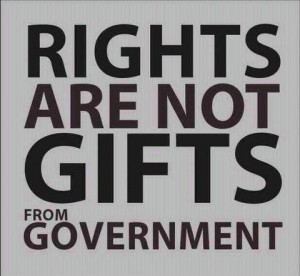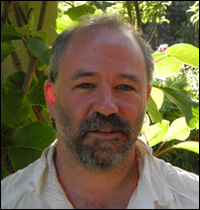The following guest blog is by Jeff Conant, who participated in the BARONA (Bay Area Rights of Nature Alliance) Rights of Nature Tribunal on October 5, 2014. With 150 people in attendance, the tribunal imagined how different our world might be if our legal system saw ecosystems as rights-bearing entities—rather than as property to be destroyed for profit. Would fracking be legal? Deep-sea oil drilling? The tribunal examined the violations of community and nature’s rights using Chevron’s refinery in Richmond, CA as a case study. Five judges heard the eloquent testimony of many experts, including residents most affected by the refinery. Recognizing legal standing for ecosystems is a concept that has been gaining strength over the past decade, in dozens of US communities and in the constitution of Ecuador.
When the newly formed BARONA held a tribunal to see what it might look if we held the fossil fuel industry to account for its violations of the rights of the living universe, I had the opportunity to indulge in a little Stephen Colbert-style theatrics, by playing the role of defense attorney for the industry:
Honorable judges, esteemed witnesses, ladies and gentlemen of the public, I said in my opening speech, if it were not for my client, the fossil fuel industry, none of you would be here today. The energy economy is the very foundation of every advance that we as a civilization have benefited from for the past hundred and fifty years. Yet, despite this fundamental fact, there are those among you who insist that somehow my client has done wrong.
As defense attorney for industry, my arguments were based on two principles – principles we hear again and again from corporations, especially the big nasty ones like Monsanto and Chevron – 1) Our products may have fatal side effects, but they make your life possible, or at least convenient, and 2) Might Makes Right—including the “right” of corporations to be seen as “persons” with vast powers under law to make a profit.
Of these arguments, the first is the hardest to refute. Having grown up in the golden age of fossil fuels (and, most likely, toward the end of this age), we know no other way of living. So, to propose an idea as paradigm-shifting as Rights of Nature is, to say the least, preposterous. But for corporations to maintain their psychic stranglehold over us, they depend just as much on argument #2: we have the power and we’re not letting it go.
And this is precisely where the question of rights comes in as a strategic approach. Ever since the French Revolution, popular pressure to recognize human rights has been a key strategic approach to resisting abuses of power, whether by states or corporations. Though it is still in its infancy as a movement, efforts to gain recognition for the rights of nature could be an important element within a broader set of strategies to resist the abuses of corporate rule.
One of the witnesses at the tribunal, Corinna Gould, a local Ohlone woman who has been active for years in defending the history and culture of Bay Area native peoples, made the point that the U.S. Constitution was written by and for wealthy white men. Well, let me tell you, as the defense attorney for Industry, that really got my goat – so here’s what I replied:
 Let’s remember our history. The Constitution is not the only document written by and for white men in this country. Following the 13th Amendment, which gave people of African descent the status of human beings, some friends of ours wrote the 14th Amendment which says that “No state shall deprive any person of life, liberty or property without due process of law nor deny to any person the equal protection of laws. Thanks to the Supreme Court decision San Mateo County vs. Southern Pacific Railroad, corporations, as we know, are persons. Therefore, under current law – and I don’t see this changing anytime soon – corporate persons, like my client the fossil fuel industry, have rights. Fairy tales like Mother Earth, on the other hand, do not.
Let’s remember our history. The Constitution is not the only document written by and for white men in this country. Following the 13th Amendment, which gave people of African descent the status of human beings, some friends of ours wrote the 14th Amendment which says that “No state shall deprive any person of life, liberty or property without due process of law nor deny to any person the equal protection of laws. Thanks to the Supreme Court decision San Mateo County vs. Southern Pacific Railroad, corporations, as we know, are persons. Therefore, under current law – and I don’t see this changing anytime soon – corporate persons, like my client the fossil fuel industry, have rights. Fairy tales like Mother Earth, on the other hand, do not.
In this case, as the faux-lawyer defending the status quo, I rejected the notion that ecosystems should have rights using a version of the Might Makes Right argument that says we are right because we made the laws.
The point I hoped to make, though, was the opposite: laws are meant to uphold and protect rights—those inalienable rights that come not from government but by virtue of being born. Living things have rights, and laws are made by people. When laws are unjust and deny rights, they can be changed by people. It is never easy, and it takes time – but power does change hands.
Of course, it’s not only Might that makes Right. In the current era of market fundamentalism, wealth also makes Right, which is why, as defense attorney, I made this point:
When the Chevron refinery in Richmond California suffered a regrettable fire in 2012, we paid the fines. Indeed, that same year, 2012, Chevron earned over $26 billion – its highest annual profits ever. If my client were not within its rights, would our profits continue to grow? Ladies and gentlemen, I don’t think so. And what have we done with these profits? Around the world, we have built schools, clinics, water treatment facilities, parks. We sponsor sports teams.
Does Mother Earth sponsor sports teams? No, she does not.
Your honors, I rest my case.
 Jeff Conant lives in Oakland, CA with his wife and family. When he is not moonlighting as a faux-defense attorney for the likes of Chevron Corp. he is the director of Friends of the Earth’s international forests program, which seeks to protect forests and the rights of forest-dependent peoples by addressing the root causes of forest destruction. A longtime global justice activist, he also co-authored A Community Guide to Environmental Health (Hesperian Health Guides, 2008), a comprehensive community education manual which is being translated into numerous languages. As an independent journalist, Jeff has written frequently for outlets such as Alternet, Corpwatch, Earth Island Journal, Yes!, Race, Poverty and the Environment and Z Magazine.
Jeff Conant lives in Oakland, CA with his wife and family. When he is not moonlighting as a faux-defense attorney for the likes of Chevron Corp. he is the director of Friends of the Earth’s international forests program, which seeks to protect forests and the rights of forest-dependent peoples by addressing the root causes of forest destruction. A longtime global justice activist, he also co-authored A Community Guide to Environmental Health (Hesperian Health Guides, 2008), a comprehensive community education manual which is being translated into numerous languages. As an independent journalist, Jeff has written frequently for outlets such as Alternet, Corpwatch, Earth Island Journal, Yes!, Race, Poverty and the Environment and Z Magazine.